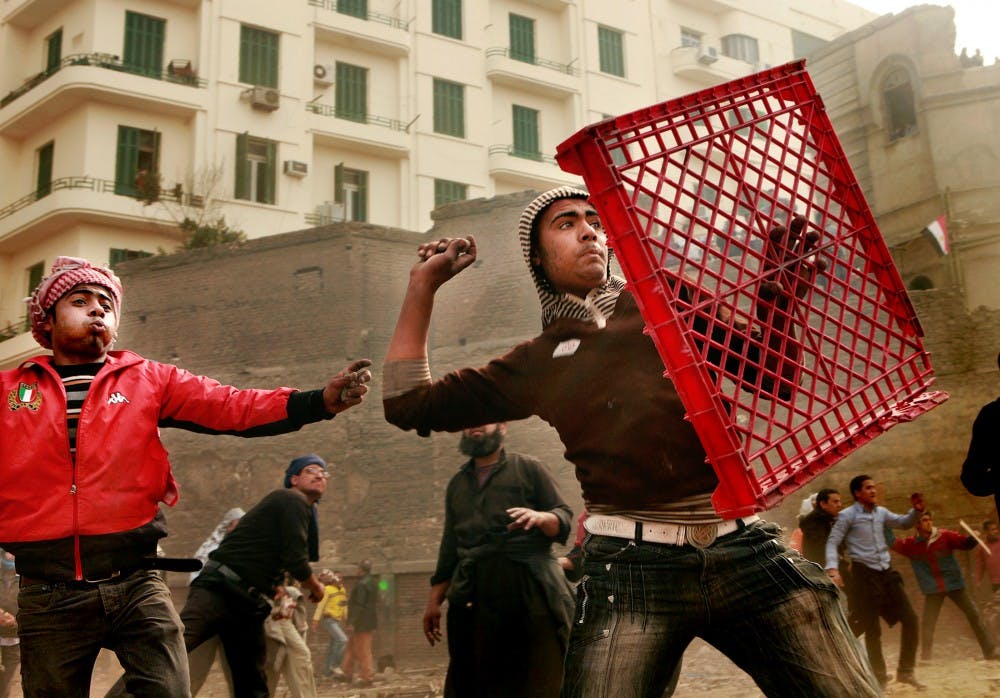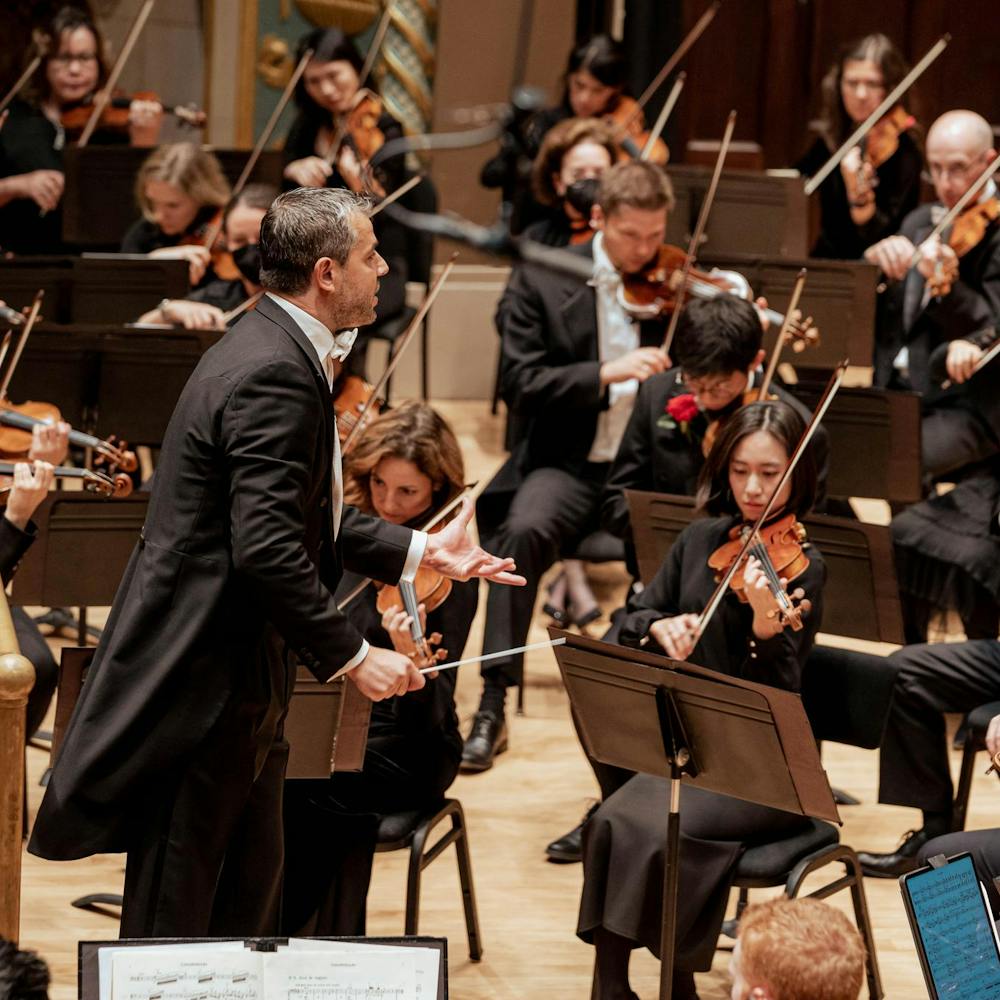From in between houses, the anthropology and Arabic senior who is studying at the Alexandria University witnessed thousands of people marching down the main street. Children were carried on shoulders, and women wore high heels the mark to occasion. In the months before, Chughtai had seen a deep unhappiness and desolate apathy in the Egyptians. It was gone now. They shouted chants and encouraged others to join them as they took the first steps to protest the end of a regime — the first steps toward their freedom.
“It was very beautiful,” Chughtai said. “For the first time since I was in Egypt, it felt like the people had hope.”
Protests have erupted in Egypt, initially against President Hosni Mubarak, with civilians calling him to step down after a 30-year rule. Mubarak announced Tuesday he will not run in September’s elections but will remain president until then, a statement that has divided protesters and turned the once-peaceful riots violent.
As of press time Thursday, the Obama administration was engaged in talks with the Egyptian government about the possibility of Mubarak’s immediate resignation, according to various media reports.
Halfway around the world, East Lansing is far from the chaos, but no less connected to the cause. For many MSU students, Egypt is home, and the conflict is close. And for students like international relations junior Dena Elian, it is time to step up.
“We’re not living in a bubble wrap,” Elian said. “We shouldn’t allow ourselves to be desensitized to something we hear on the news just because they’re so far away.”
Why are they revolting?
Deprivation of human rights, a 30-year dictatorship, constant abuse and fear from the very authority meant to protect. The words evoke sympathy, but the reality of Egypt’s events have become lost for Americans somewhere across the Sahara and Atlantic Ocean, said Wafa Hassan, a professor in the Department of Linguistics and Germanic, Slavic, Asian and African Languages.
“There’s a huge difference between poverty in Egypt and poverty in America,” Hassan said. “I don’t think (American students) don’t care; it’s a totally different situation. Here, students have so many more opportunities than in Egypt.”
Several factors have lead to the revolt including similar events in Tunisia, illegitimate elections where much of Mubarak’s opposition was eliminated and the media attention brought to the story of Khaled Saeed, a fatality of Egyptian police brutality. The publicity received by Saeed’s story was a surprise because such violence is not a rare occurrence, said international relations and comparative cultures and politics junior Nehal Amer.
“Police brutality is just common,” Amer said.
Amer lived in Egypt until she was 4 years old and continued to return during the summers and for her freshman year of high school. Living under Mubarak’s rule was “suffocating.” Within the walls of her home and the security of the immediate family, Amer would express her frustration with the president. But in any other circumstance, she was silent. Anyone could be a member of Mubarak’s secret service, she said. Even crossing an ocean did not lessen the tension. For years, Amer refrained from posting anything negative about her county or Mubarak on the Internet.
“I was afraid I would never be allowed back into my country, or something would happen to my family members,” Amer said. “(Now) I have just gone crazy here expressing my opinion left and right. I just can’t tell you how it feels — it just feels like it’s a release. Finally, I can say what I need to say.”
Shaking things up
For three days, international relations sophomore Hussein Kazan couldn’t focus. His home might have been looted. His parents might be injured. He couldn’t know. All phone lines, all Internet connections to his family had disappeared.
“I couldn’t function on my studies, nothing,” Kazan said. “It’s all I was thinking of for those three days.”
Like many Egyptians who must watch their country descend into chaos from a distance, Kazan was worried, yet at the same time, proud of his country and hopeful for its future.
“The stock market is down the drain; people are losing money,” Kazan said. “But for the long term it’s good.”
For college-aged students, Mubarak’s regime is the only one they have ever known.
“It’s inconceivable for me,” Amer said. “I thought he would never leave.”
Support student media!
Please consider donating to The State News and help fund the future of journalism.
Although Amer grew up in a democracy, she still can relate to why Egyptians have kept quiet for so long.
“When you’re growing up in that kind of environment, you just kind of accept it,” Amer said. “You’re just so suppressed; you kind of force yourself to focus on other things.”
For Egyptians, the “other things” are becoming the basic necessities. Citizens are without food, water or money. The economy is poor. Living is expensive, and health care is lacking.
It was a 30-year bubble about to burst, and Egyptians are thrilled, Elian said. Finally, she said, Egyptians are standing up and taking back their rights.
“Mubarak has shook this bottle,” Elian said. “The cap has finally been thrown off.”
History in the making
Above Tahrir Square, international relations and Arabic minor Amber Judd watched the protests unfold in her hotel room. She was secure, safe.
Then she went outside.
Among the protestors, Judd said there was a peaceful atmosphere. The streets were safe to those using common sense. As of Tuesday, the worst that had happened to her was a face full of tear gas near the Egyptian Museum.
“I realized that the situation is dangerous,” Judd said. “But I also know that I’m in the middle of history being made. I want to see it happen.”
Miles away, Kazan shared Judd’s sentiment.
“I’ve been dying to go to Egypt all this past week,” he said. “I feel like all my fellow Egyptians feel the same way. … This revolution (during) these seven days could change what Egypt represents for the next 50 years.”
Judd was present for one of the major protests, Tuesday’s March of Millions, weaving her way through the crowds and tents in Tahrir Square. The citizens had united through their anger with Mubarak, but the atmosphere was palatable, friendly. Judd chatted with the protestors who offered her food and water, inquiring if she felt safe in the region.
“When we go out, we tell Egyptians that we support them, and I do feel like it’s important,” Judd said.
“It feels amazing I’m witnessing something so important.”
Even as the U.S. began to evacuate people from the county, Judd continued to stay in Egypt. Her ticket to the county was one-way, and she initially planned to stay until August.
“How could you come to somewhere like this and see people fighting for something they believe in and want to escape?” Judd said. “I can’t go home and watch this on the news.”
Standing together
Tamara Patterson could hear them before she could see them. Near the rock on Farm Lane were about 30 protestors — students and residents of the Lansing area alike — waving signs and shouting in Arabic in the 19-degree chill in order to coincide their rally with the March of Millions.
Amer lead the chant, the crowd repeating her after each line.
“Brick by brick, wall by wall! We will see Mubarak fall!”
Like many students walking past as they headed to class, Patterson turned her head to see the protestors. And then walked on.
“It’s definitely getting people’s attention,” Patterson said. “I feel like everyone needs to be more globally aware, but I don’t know exactly what this has to do with MSU.”
For Amer, the rally is meant to do more than merely attract attention. She wishes to inform MSU students of the role they play in the violence as taxpaying American citizens.
“Obama, Obama don’t you know?” Amer cried. “Hosni Mubarak’s got to go!”
As an American citizen born in Saudi Arabia, Amer’s reality of America’s involvement is more tangible. According to the State Department, the U.S. gives $1.3 billion to the Egyptian government annually. That means tax dollars Amer’s parents family pay in America are translating to tear gas canisters thrown at her friends, Amer said.
“It’s frustrating. It makes me really just upset and angry,” Amer said. “Our lives are that expendable? Our tax dollars held up this dictatorial regime for 30 years?”
After the fall
Secondary education senior Yasmine Abdulhamid was in the Peanut Barrel, 521 E. Grand River Ave., when she first heard the news. Eight days of protests hadn’t gone unanswered. Mubarak announced that he would be leaving.
Then came the backlash — he wanted to maintain his position until elections in September.
“A lot of people are nervous about, if Mubarak steps down, if the country will be stable or not,” Abdulhamid said.
“We’ve given Mubarak 30 years to see if he could make Egypt a better country, and he couldn’t live up to that.”
The protests not only have continued, they have grown more violent as pro-Mubarak supporters have begun to make their voice heard, although anti-Mubarak protestors question their legitimacy.
Chughtai, who left the country after two days of riots because of a midsemester break, said she has seen divisions among her friends. Some plan to continue the protests until Mubarak steps down. Others are not in support of Mubarak but want the looting and violence to end. Then there are those, mainly Egyptians, whose parents work in government positions or come from wealthy families, who are praising Mubarak.
In response to the continued protests, Abdulhamid and about six other MSU students are taking a bus to Washington, D.C., this weekend to march with an estimated 5,000 protestors from the Egyptian embassy in Washington, D.C., to the White House. Abdulhamid said she hopes the
protest will encourage President Barack Obama to put more pressure on Mubarak to leave and discontinue support of the Egyptian government.
“I think the biggest thing is that people have become stronger in their protest,” Abdulhamid said.
“We’re not going to leave, and we’re not going to believe you. Your voice doesn’t matter anymore.”
As violence increases, Egypt’s future is becoming more uncertain. Resources are running out, and violence is increasing. Judd could not be reached for comment on Thursday afternoon, but Amer said she had been in contact with her friends protesting in Tahrir Square.
“One told me not to worry and that they are staying strong,” Amer said.
“(They) won’t back off until Mubarak steps down. They’re not going home until they get their freedom.”
Discussion
Share and discuss “Chaos in Cairo” on social media.





